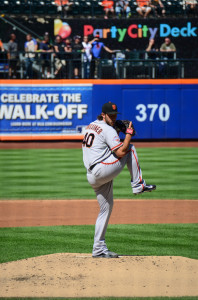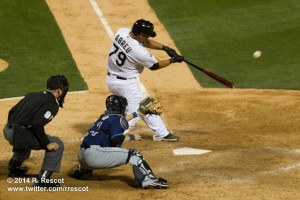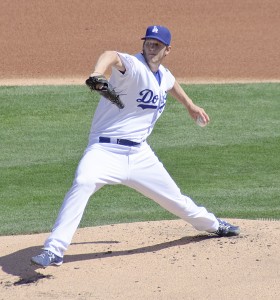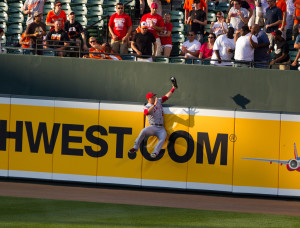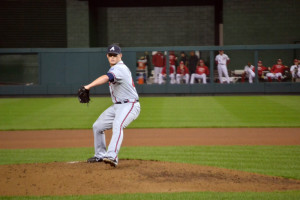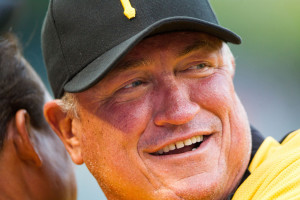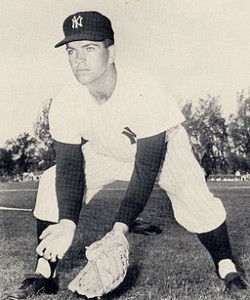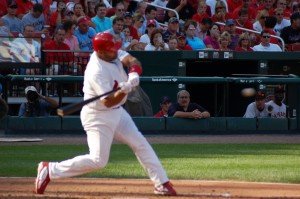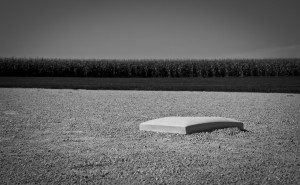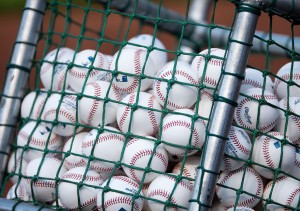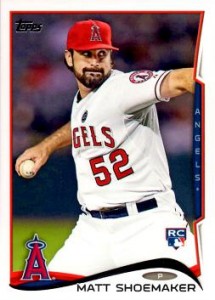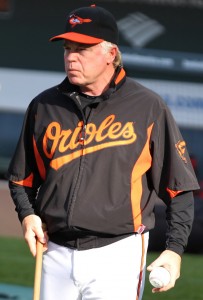On the surface, the 2014 World Series wasn’t a fall “classic” – the average margin of victory was five runs. Still, it had a tight and tense Game Seven, plenty of dazzling (at times game-changing) defensive plays, some outstanding bullpen work, Pablo Sandoval looking like Pablo Picasso at the plate (12 hits in seven games) and Hunter Pence cashing in a dozen safeties as well. But most of all, it had a truly classic performance by Giants’ “ace” Madison Bumgarner – and that made this a Series for the age.
Madison Bumgarner claimed his place in MLB World Series’ annals with 21 innings pitched (two starts and a relief appearance in Game Seven) and only one run allowed (0.43 ERA). His two victories and a save earned Bumgarner World Series MVP honors. (The scorer at first gave Bumgarner the win in Game Seven – which would have enabled him to tie the MLB record for victories in a single Fall Classic, but later changed that to a save.) The superlatives were flowing freely during the game coverage and still continue in the traditional and social media. And, rightfully so. The Series MVP started Game One and threw seven innings of three-hit, one-run ball; followed up with a three-hit complete-game shutout in Game Five; and wrapped it up by coming on in relief in Game Seven to toss five innings of two-hit ball in the Giants’ 3-2 victory. Over his twenty-one innings of work, Bumgarner allowed just one run, nine hits and one walk, while striking out seventeen. For the Giants: No doubt, no Bumgarner, no Series title.
It was clearly a performance for the ages. In fact, it may have been the best World Series pitching performance ever (particularly given the futility of the rest of the Giants’ pitching staff and Bumgarner’s short-rest Game Seven shutdown of the Royals).
All the talk about Bumgarner got BBRT to thinking about past World Series pitching performances – the likes of which we’ll likely never see again. I’m talking about achievements like:
- Starting five games in a single World Series (best-of-nine Series) in just 13 days – completing them all.
- Throwing three complete-game shutouts – in a five-game series.
- Notching three complete-game wins in a single World Series – as a rookie.
Why aren’t we likely to see these kinds of numbers in the future? First, “going the distance” is no longer a priority, seven innings is considered going deep; second, the increasing adherence to pitch counts; third, “closers gotta close,” setting up your designated 7th, 8th and 9th inning hurlers has become integral game strategy; and, fourth, the extended post-season means starting pitchers have thrown a considerable number of high-pressure playoff innings by the time they get to the World Series. (Bumgarner had started four 2014 post-season games before Game One of the World Series; going 2-1, 1.42 in 31 2/2 postseason innings before throwing his first World Series pitch.) Applause and thanks to Giants’ manager Bruce Bochy for ignoring all these factors – and to Madison Bumgarner for rewarding his confidence.
Given all that, BBRT decided to look back on those World Series’ performances in which a pitcher not only notched three victories in a single Series, but also limiting the review to those instances in which all three wins were complete games.
Despite Bumgarner’s magnificent 2014 achievements, BBRT’s vote for the number-one World Series pitching performance ever still belongs to:
1905 – Christy Mathewson – Three complete-game shutouts in six days
In 1905, the great Christy “Big Six” Mathewson tossed a record three complete-game shutouts in a single World Series – and he did it in a five-game Series. In just six days, the future Hall of Famer started and finished Games 1, 3 and 5 – tossing 27 innings, giving up just 13 hits and one walk, while fanning 18.
On October 9, in Game One, Mathewson tossed a four-hitter, never allowing more than one base runner in an inning (singles in the fourth and sixth innings, ground-rule doubles in the eighth and ninth), as the Giants prevailed over the Athletics 3-0. Mathewson allowed no walks and fanned six.
On October 12, Mathewson tossed a second four-hit shutout in an easier 9-0 victory. In this game, all four hits were singles and Mathewson also hit one batter and walked one (while fanning eight).
Then, on October 14, Big Six tossed a five-hitter (four singles and a double) in a 2-0 win. In this game, he logged no walks and four strikeouts.
Mathewson’s dominance was no surprise. In his prime – and on the way to 373 MLB wins – he was coming off a league-leading 31 wins (9 losses), NL-best eight shutouts, league-high 206 strikeouts and league-low 1.28 regular season ERA. Just how good was Mathewson? In 17 MLB seasons, he logged four seasons of 30+ wins and another nine campaigns of 20+ victories – while leading the his league in victories four times, ERA five times, and strikeouts four times.
Now, here’s a look – in chronological order – at all the other hurlers to log three complete-game victories in a single World Series. Hall of Famers are first referenced in Bold Face/Red/Italics.
1903 World Series – Bill Dinneen AND Deacon Phillippe
Considered the first official AL/NL World Series, the 1903 Boston Americans/Pittsburgh Pirates match-up was a “best five-of-nine” that went eight games (and saw two pitchers win three World Series games).
The hero of the 1903 World Series was Boston Americans’ right-hander Bill Dinneen, who picked up three victories in four starts – tossing four complete games in the process. That the 27-year-old Dinneen was the Americans’ pitching star came as a bit of a surprise, since the Boston staff was led by righty Cy Young – who had just rung up a league-leading 28 regular season victories (nine losses), the 36-year-old veteran’s fifth time leading the league in wins. Of course, Dinneen was no slouch, having gone 21-13, 2.26 in the regular season (after a 21-21 record in 1902). The Americans’ staff boasted a third 20-game winner in Tom Hughes, who finished 20-7, 2.57 (his only twenty-win campaign). Young did have a good post-season 2-1, 1.85 in three starts and one relief appearance – while Hughes lasted only 2 innings in his only start.
It was Dinneen, however, who brought the World Championship to Boston, starting games 2, 4, 6 and 8 and picking up three wins versus one loss (Game Four, 5-4). His efforts included four complete games, as well as two shutouts (Game two and the Game Eight clincher). Dinneen gave up just eight earned runs in his four starts (2.06 ERA), pitching 35 innings – with 29 hits, eight walks and 28 strikeouts. The 1903 World Series was pretty much the highlight of the hard-throwing Dinneen’s 12-year MLB career, in which he went 170-177, 3.01 and made it to the post-season just the one time. He did, however, win 20 or more games four times.
On the Pittsburgh Pirates’ side of the field, right-hander Deacon Phillippe did all he could to bring the first World Championship to Pittsburgh – starting, and completing, a still Series-record five games in 13 days (October 1 – October 13). Phillippe was truly the Pirates’ ace. He had gone 25-9, 2.43 in the regular season – his fifth straight twenty-win campaign. In the Series, he started Games 1, 3, 5, 7, and 8 (when he came up against the hot hand of Dinneen). Phillippe won his first three starts, but lost the final two. Phillippe finished the Series 3-2, 3.07, tossing 44 innings, giving up 38 hits, 15 earned runs, three walks, and striking out 22. While Phillippe would have only one more twenty-win season after 1903, he did finish his 13-year MLB career with a 189-109, 2.59 record and led the NL in winning percentage (14-2, .875) in 1910 (at the age of 38).
1909 World Series – Babe Adams, the rookie
Although he had the proverbial “cup of coffee” in the major leagues in 1906-07 (appearing in five games), Charles “Babe” Adams still qualified as a rookie when he went 12-3, 1.11 for the Pittsburgh Pirates in 1909. The rookie right-hander went on to pitch three complete-game victories for Pittsburgh (over Detroit) in the World Series, including a six-hit shutout in the final game (an 8-0 Pirates’ win). For the Series, Adams gave up just four earned runs, with 18 hits, six walks and 11 strikeouts. Adams went 194-140, 2.76 in 19 MLB seasons – walking only 430 hitters in 2,995 1/3 innings. On July 17, 1914, Adams pitched a 21-inning complete game without issuing a single walk, which remains the longest game without a walk in MLB history.
1910 World Series – Jack Coombs, three wins in six days
Philadelphia Athletics’ Jack Coombs matched Christy Mathewson’s three complete-game victories in a five-game Series in 1910, as the Athletics topped the Cubs. Coombs pitched Games 2, 3 and 5 giving up ten earned runs in his 27 innings of work (24 hits, 14 walks, 17 strikeouts). Like Mathewson, Coombs was coming off a spectacular regular season (his 31-9 mark was identical to Mathewson’s 1905 stats and he led the AL in wins). Coombs also had a minuscule 1.30 regular-season ERA. The 27-year-old rightly led the AL in wins again in 1911 with 28 and won 158 games in a 15-season MLB career.
1920 World Series – Stan Coveleski and three five-hitters
In 1920, the Cleveland Indians topped the Brooklyn Robins four games to three, with Stan Coveleski throwing three, complete-game five-hitters – winning Game Two 3-1, Game Four 5-1, and Game Seven 3-0. The thirty-year-old Coveleski went 24-14, 2.49 in 1920 – the third of four consecutive twenty-win seasons. He had perhaps his best season in 1925 (age 35), going 20-5 for Washington, leading the AL in winning percentage (.800) and ERA (2.84). In 14 MLB seasons, he went 215-142, 2.89
1957 World Series – Lew Burdette leads underdog Braves
The 1957 Milwaukee Braves surprised the heavily favored Yankees behind the fidgety right-arm of Lew Burdette (who pitched in his first MLB game as a Yankee). Burdette started and completed Games 2, 5 and 7 of the Series. In Game Two, he gave up seven hits and two runs, as the Braves won 4-2. He followed up with a pair of seven-hit shutouts (1-0, 5-0). Burdette seemed an unlikely World Series “ace.” At 17-9, 3.72, he was actually third on the Braves’ staff in regular season wins behind lefty Warren Spahn (21-11, 2.69) and righty Bob Buhl (18-7, 2.74) and fourth among starters in ERA (Gene Conley’s ERA was 3.16). Burdette went 203-144, 3.66 in 18 MLB seasons – winning twenty or more games twice.
1967 World Series – Bob Gibson brings the heat
Cardinals’ ace Bob Gibson notched three complete-game victories over the Red Sox in the 1967 World Series (Games 1, 4 and 7), including a Game Four shutout. For the Series, Gibson threw 27 innings, giving up just three runs on 14 hit and five walks, with 26 strikeouts. In 1967, Gibson went 13-7, 2.98 – a mid-season leg injury limited him to 24 starts. In the 1968 Series, while “only” going 2-1 in three starts, Gibson set the record for strikeouts in a single World Series (35) and for a World Series game (17 in Game One). In a 17-year MLB career, Gibson went 251-174, 2.91 – with 3,117 strikeouts.
1968 World Series – Mickey Lolich on the big stage
In 1968, Detroit Tigers’ Mickey Lolich took a back seat to teammate Denny McLain – who went 31-6, 1.96 in the “Year of the Pitcher.” Lolich, who had a solid season at 17-9, 3.19, however, stole the spotlight with three complete-game victories in the World Series. Lolich’s 16-season MLB totals were 217-191, 3.44, including a 25-14, 2.92 season in 1971.
Very honorable mention in this post goes to four pitchers who earned three victories (just not complete-game victories) in a single World Series: Joe Wood (1912 Red Sox/eight-game Series); Red Faber (1917 White Sox); Harry Brecheen (St. Louis Cardinals, 1946); and Randy Johnson (2001, Diamondbacks).
